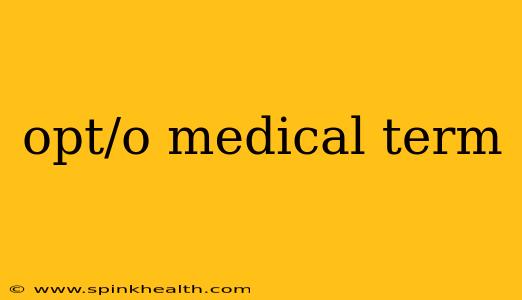Decoding "Opt/o": A Journey into the World of Vision
The seemingly simple "opt/o" holds a fascinating story within the world of medical terminology. It's not just a random collection of letters; it's the root that unlocks the secrets of vision, illuminating the complexities of the eye and its intricate functions. Let's embark on a journey to understand its meaning and significance.
What does opt/o mean?
At its core, "opt/o" means "eye" or "vision." It's a combining form, meaning it's a word element that combines with other elements to create medical terms. Think of it as a building block in the language of medicine. This tiny word element is the foundation for numerous terms used to describe various aspects of ophthalmology, the branch of medicine dealing with the eye and its diseases.
Common Medical Terms Using "Opt/o"
Several important terms use "opt/o," providing clarity and precision in describing eye conditions and procedures. Let's explore some of the most frequently encountered:
-
Optometrist: This is the most familiar term. An optometrist is a healthcare professional who examines, diagnoses, treats, and manages diseases, injuries, and disorders of the visual system. Their expertise lies in refractive error correction, such as prescribing eyeglasses or contact lenses.
-
Ophthalmologist: This term might be confused with "optometrist," but there's a crucial difference. Ophthalmologists are medical doctors (MDs or DOs) specializing in eye and vision care. They can perform surgery, diagnose and treat a wider range of eye diseases, and even prescribe medications.
-
Optician: Opticians fill prescriptions written by optometrists or ophthalmologists, crafting and dispensing corrective lenses. They are skilled in lens fitting and ensuring the proper functionality of eyewear.
-
Optic nerve: This crucial nerve transmits visual information from the retina (the light-sensitive tissue at the back of the eye) to the brain, allowing us to see. Damage to the optic nerve can lead to vision loss.
Understanding the Differences: Optometrist vs. Ophthalmologist
Many people confuse the roles of optometrists and ophthalmologists. This section will clarify the distinction:
Optometrist:
- Education: Typically holds a Doctor of Optometry (OD) degree.
- Focus: Primary eye care, vision correction, and managing common eye conditions.
- Procedures: Performs vision tests, prescribes eyeglasses and contact lenses, and manages certain eye diseases.
- Surgery: Does not perform surgery.
Ophthalmologist:
- Education: Holds a medical degree (MD or DO) followed by specialized training in ophthalmology.
- Focus: Diagnosis and treatment of a wide range of eye diseases, including performing eye surgery.
- Procedures: Performs comprehensive eye exams, diagnoses and treats eye diseases, and performs surgical procedures like cataract surgery and LASIK.
- Surgery: Performs eye surgery.
Why is understanding "opt/o" important?
Understanding "opt/o" and its role in medical terminology empowers patients to better understand their diagnoses and treatment plans. It aids communication between patients and healthcare providers, promoting a more informed and collaborative approach to eye care.
This journey into the world of "opt/o" highlights the importance of understanding medical terminology. It's not just about memorizing words; it's about grasping the underlying concepts and empowering ourselves with knowledge. Whether you are considering an eye exam or seeking clarification on a diagnosis, knowing the basics can make a real difference.

